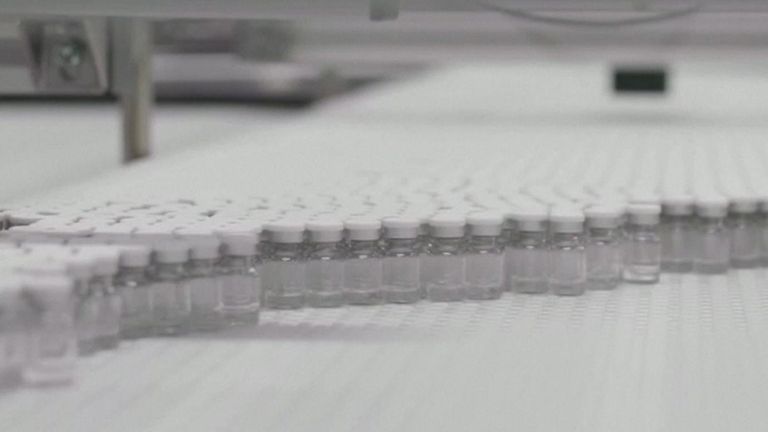US company Moderna has announced its COVID-19 vaccine may be 94.5% effective against the virus.
The interim trial results come one week after Pfizer/BioNTech released early results for phase three of a vaccine study which suggested their candidate had an efficacy of 90%.
So how do the two vaccine candidates compare?
Both the Pfizer and Moderna jabs use technology known as mRNA, which introduces into the body a messenger sequence that contains the genetic instructions for the vaccinated person's own cells to produce the antigens and generate an immune response.
Effectiveness
The preliminary data suggests the Pfizer vaccine offers around 90% protection against COVID-19, while Moderna's results indicate 94.5% effectiveness.
However, the researchers behind both vaccines say their trials are ongoing and that the final numbers could change.
Transport and storage
One of the main differences between the candidates is how they need to be stored. The Moderna vaccine is much easier to distribute than the Pfizer jab, around which there are concerns.
During shipment and storage, the Pfizer vaccine candidate must be kept at around (-70C) (-100F) to maintain optimal efficacy.
It also has to be mixed with another liquid before it can be administered.
The Moderna vaccine has been shown to last for up to 30 days in household fridges, at room temperature for up to 12 hours, and remains stable at -20C - equal to most household or medical freezers - for up to six months.
The company claims mRNA-1273 can be distributed using widely available vaccine delivery and storage infrastructure - with no dilution required prior to vaccination.
Andrew Hill, senior visiting research fellow in the department of pharmacology at the University of Liverpool, said: "This vaccine would be much easier to transport and administer than the one from Pfizer.
"Also the preliminary evidence suggests that it can prevent severe COVID-19 disease. However, the Moderna vaccine is more expensive and there are fewer doses available in the next year."
Cost
That brings us to the price tag.
The Moderna vaccine is very expensive. It was pitched for $38 (£28) a dose during the summer - much higher than Pfizer, at $20 (£15).
While this was in smaller quantities and deals will be done to cut the price for bulk purchases, Moderna - a commercial company - has an interest in making profits.
:: Subscribe to the Daily podcast on Apple Podcasts, Google Podcasts, Spotify, Spreaker
Dr Zoltan Kis, research associate at the Future Vaccine Manufacturing Hub, Imperial College London, said the Moderna vaccine's higher mRNA amount per dose (100 micrograms) compared with Pfizer's (30 micrograms) meant the latter could be produced in higher numbers and at lower cost.
He added that transport issues with Pfizer may counteract that initial advantage, but pointed to the higher temperature at which the Moderna candidate could be stored.
"Therefore, once approved by the regulatory authorities, Moderna's COVID-19 vaccine can be distributed substantially easier and at lower costs compared to the BioNTech/Pfizer vaccine," he said.
UK availability
The UK has ordered five million doses of the Moderna vaccine, to be delivered by spring. Health Secretary Matt Hancock said this candidate would not be available anywhere in Europe until then.
Downing Street said: "The news from Moderna appears to be good and represents another significant step towards finding an effective COVID-19 vaccine."
Moderna's first target is the US market since it has been developed with the help of the federally funded National Institutes of Health and the US Department of Health and Human Services.
It has also received $2.4bn (£1.8bn) funding from the US government and plans to have 20 million doses available for use in the US by the end of the year - meaning other countries must form an orderly queue.
Meanwhile, the UK government has secured around 40 million doses of the Pfizer vaccine - enough for 20 million people or about a third of the UK population.
It expects 10 million of these doses to arrive before the end of this year, with those chosen to get the jab receiving two doses, 21 days apart.





